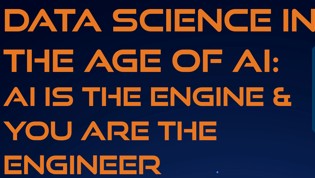By Sophie Yang ’27

The Dominguez Center for Data Science recently hosted an engaging talk by Dr. Chester Ismay, who shared how generative AI tools are transforming complex data science projects. He highlighted how data science bridges mathematics, computing, and domain expertise, while emphasizing the importance of clear communication, ethical responsibility, and reproducibility in analytical work. Drawing from his own projects and experiences, Dr. Ismay encouraged students to cultivate curiosity, critical thinking, and adaptability as technology continues to evolve. The session concluded with an open Q&A that deepened participants’ understanding of how students and data professionals can use generative AI effectively and responsibly.
Dr. Ismay illustrated his approach through several case studies, including The U.S. States Quiz App, which showcased how AI can collaborate with humans in applied data projects. His workflow followed four key stages: Initial Concept, where he defined the goal of creating an interactive quiz app to test knowledge of U.S. states; AI Prototyping, where ChatGPT helped scaffold the Shiny app’s interface and generate R code; Debug & Refine, where AI assisted in identifying syntax errors and improving code efficiency; and Human Polish, where he validated data, refined the design, and enhanced usability. This example demonstrated how AI can accelerate development through rapid layout creation, code generation, and debugging, while human expertise remains essential for logic validation, user experience, and handling edge cases.
When asked how beginners should approach learning programming in the age of AI, Dr. Ismay emphasized that while AI can enhance learning, students must still build a strong foundation in how code works. He encouraged them to start with core principles such as understanding variables, logic, and theory, which form the mental framework for solving problems independently. He also explained that AI can serve as an interactive learning partner. For example, students can use it to quiz themselves, review their code, and request analogies or alternative explanations to deepen understanding. Yet true mastery comes from breaking complex problems into smaller parts and thinking systematically before relying on AI. Dr. Ismay also encouraged learners to build community by collaborating with peers, using AI to support accountability and exploration, and tackling projects that challenge their comfort zones. Ultimately, he reminded students that creativity, curiosity, and human insight remain irreplaceable, these are key traits that make humans special and able to use AI effectively.